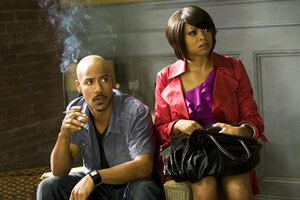Film evens out melodrama before it all goes Bad
It takes a confused director to make a film like I Can Do Bad All By Myself. Tyler Perry, who is the world’s most bankable drag queen as the legendary and legendarily crass old woman Madea, seems to be just that type of person.
Perry, the famous filmmaker whose review-proof films are consistent hits within black communities, lacks the mature sensibilities to prevent his film from quickly devolving into a mess of potent melodrama, music and comedy. Perry got his start on stage, however, and his theatrical sensibilities essentially make up for the tonal jumpiness of I Can Do Bad All By Myself.

Bad girls · I Can Do Bad All by Myself stars director Tyler Perry as Madea and Oscar-nominee Taraji P. Henson (above) as April. - Photos courtesy of Lions Gate Entertainment
His latest film concerns a selfish young lounge singer named April, played by the effervescent Taraji P. Henson, who finds herself stuck with the three children of her deceased sister after their grandmother goes missing.
April eventually finds herself roadblocked by a number of decisions about what to do with the kids, as well as being forced to choose between Colombian immigrant Sandino (Adam Rodriguez), who skews somewhere between saint-nice and serial killer-nice, and philandering sociopath Randy (Brian White), who goes over-the-top in the opposite direction.
It is to the credit of Perry and Henson that April maintains an aloof attitude toward the entire melodramatic plot, remaining cold and sarcastic toward Sandino and her charges for much longer than most films could hold out without a change of heart.
The story is set in motion by a break-in at the home of Madea, a plot point which inspired the shameless riff on the classic poster for Sam Peckinpah’s Straw Dogs. The defiant old woman and her housemate Uncle Joe (also Perry) catch the children, and comedy mostly involving Madea threatening the defiant kids ensues. Using Madea in such a melodramatic movie is a sometimes-careless waltz with comedy that cheapens some excellent dramatic acting by the other principles.
Madea, who has been around since the early ’90s, is wearing out her welcome among some of Perry’s constituents, but for a neophyte she is a genuinely entertaining character. But I Can Do Bad All By Myself is not really Madea’s movie, and she eventually disappears from the scene altogether so Perry can focus on his melodramatic and musical elements a little more lucidly.
I Can Do Bad All By Myself is simultaneously a musical film featuring only lounge and gospel performances. Perry deftly displays his experience in theater and films in all the musical performances with a sure hand. Each song is used effectively to show character development, particularly within April, which lends the scenes of emotional transformation a deeper power that mere dialogue simply cannot convey.
Performing a cool opening number, Henson acquits herself nicely amongst the likes of Gladys Knight and real-life Detroit pastor Marvin Winans, but the real showstopper is Mary J. Blige. The hip-hop legend brings down the house performing the soulful “I Can Do Bad,” (which she co-wrote), which is the film’s unsurpassable high note.
I Can Do Bad All By Myself spreads itself very thin between several genres, and as such it is painted in mostly broad strokes. The last 30 minutes in particular are comprised of one emotional explosion after another, until eventually the audience finds itself in either laughter or tears. Naturally, the best part of I Can Do Bad All By Myself — other than Mary J. Blige’s singing voice — is the subtle moments found in between all the drama. A prime example is how April’s teenage niece, played by the wonderful young actress Hope Olaide Wilson, expresses her frustration over being forced to grow up so fast. Many of the actors in this film, not the least of whom is Henson, reveal a great amount of depth behind their eyes when they aren’t caught up in the theatricality of it all.
The film’s ending is the broadest stroke of all, one inappropriate for the 30 minutes of melodrama that precede it, yet simultaneously one befitting the film’s musical sensibilities. You can stay for the credits to see some bloopers, mostly of Madea’s scenes, which are amusing solely because they reveal quite an ego behind the director, who also has the gall to give himself first-billing.
But Perry is a bona fide phenomenon, a grand showman who knows just how to create characters in true moral and emotional distress, usually within the urban setting that reflects his own difficult childhood in the inner city of Atlanta. It is said that his movies just don’t resonate with younger black audiences, and maybe the soapy qualities of his plots aren’t helping. Yet for its scenes of complex emotion, its moments about the power of music and, especially for Henson, I Can Do Bad All By Myself is a worthwhile film for anyone who doesn’t mind an overload of theatricality.
